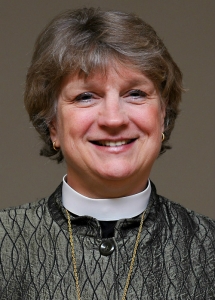 By Bishop Ann Svennungsen
By Bishop Ann Svennungsen
May 2 was the sixth anniversary of the death of our son John Amos. He was 30 years old and died after a long and courageous fight against cancer.
Of course, my mind is filled with memories of John. But, these past weeks, I’ve been thinking especially about his teachers. John had Down Syndrome – the process of learning was different for him. And I was continually amazed by how John’s teachers could break learning down into tiny increments; small steps for learning a larger task.
What are the nine steps needed to learn how to safely cross a street? In what order do you teach them? The teachers’ patience, creativity, and incremental affirmations were something to behold.
TODAY WE FACE challenges that require such skill and perseverance. What are the nine steps needed to dismantle white supremacy? To transform our criminal justice system?
Yes, a momentous step was taken just two weeks ago, when a jury found former officer Derek Chauvin guilty of third-degree murder in the killing of George Floyd.
“To each is given unique dance steps by the Spirit’s power to move the process forward toward justice for all.”
Episcopal Church Presiding Bishop Michael Curry, an African-American ecumenical leader, said after that step, “As overjoyed as I was when Barak Obama was elected president, I was less surprised then than I am today [the day of the verdict]. There was a part of me that just couldn’t give into the hope until the jury rendered its verdict. And yet, 12 jurors believed in justice enough … to do what we never thought would happen.”
It was a big deal. But so is the long walk and the many steps ahead of us.
Emilie Towns, dean of Vanderbilt Divinity School, said, “This is only one trial. We still have a whole lot of work to do in order to develop a criminal justice system that we all can believe in and that we can actually literally live in.”
THERE ARE LOTS AND lots of steps before us. For our son, John, the steps were broken down in a linear way. First one step, then the next.
In the work of societal and systemic change, steps are broken down in a communal way – shared across a whole community committed to justice – each person taking distinctive steps on the long, hard road of societal change.
Martin Luther’s work on Christian vocation is a wonderful tool here. Each of us committed to love and justice needs to find the steps we are individually called to take in this communal work. I can’t do everything. Neither can you. We need to discern our gifts, our passions, and our distinctive callings.
“Very few [church attenders] discover their Christian vocation for doing justice and seeking shalom in their neighborhoods because they worship together with other disciples of Jesus.”
Faith-based community organizing also provides important wisdom. Drew Hart, our 2021 Synod Assembly keynote speaker, in his book Who Will be a Witness, writes that, though Christians work with justice organizations, “very few … discover their Christian vocation for doing justice and seeking shalom in their neighborhoods because they worship together with other disciples of Jesus” (emphasis mine). Hart believes faith-based community organizing can provide steps for Christian communities seeking to work for justice. This is the hope of the Minneapolis Area Synod organizing department.
I am reminded of Paul’s word to the Corinthians. “To each is given the manifestation of the Spirit for the common good.” To each is given unique dance steps by the Spirit’s power to move the process forward toward justice for all.
What are the steps to which God is calling you? Today might be a good time to reflect on that question. Oh, it might not always be easy. I think of our son struggling to read the paper each morning, especially the forecast. Still, he loved to tell us if it was going to be cloudy or sunny.
A momentous step toward justice has recently been taken in our city. God bless and keep us as we continue this Spirit-led work – living out our callings to step forth – in the movement toward justice for all.
